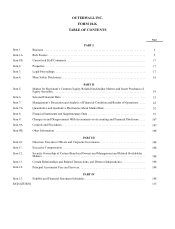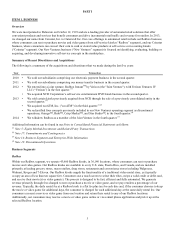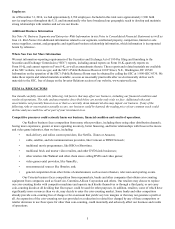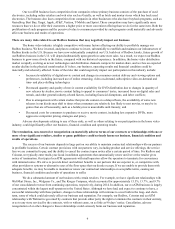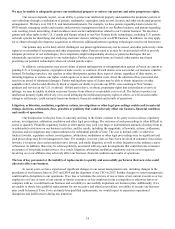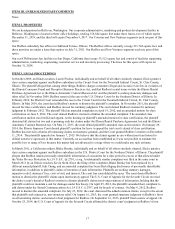Redbox 2014 Annual Report Download - page 16
Download and view the complete annual report
Please find page 16 of the 2014 Redbox annual report below. You can navigate through the pages in the report by either clicking on the pages listed below, or by using the keyword search tool below to find specific information within the annual report.8
We have entered into licensing agreements with certain studios to allow rental of their titles on the “street date,” and
with other studios to make DVDs available for rent 28 days or more after the street date. Our business, financial condition and
results of operations could be materially and adversely affected if these agreements do not provide the expected benefits to us.
For example, agreements may require us to license minimum quantities of theatrical and direct-to-video DVDs for rental at our
kiosks. If the titles or format provided are not attractive to our consumers, we could be required to purchase too many copies of
undesirable titles or an undesirable format, possibly in substantial amounts, which could adversely affect our Redbox business
by decreasing consumer demand for offered DVD titles and consumer satisfaction with our services or negatively impacting
margins. If studios that do not have a delayed rental window elect to delay the general release of DVDs to the rental market for
significant periods after they are released for retail sales, demand for rental of these titles may be adversely affected. In
addition, we have incurred, and may continue to incur, additional non-cash increases to operating expenses, which are
amortized over the terms of any such arrangements, that also could have a dilutive impact on our stockholders, such as the
issuance of equity under certain of our existing studio contracts or to the extent we enter into similar arrangements with other
movie studios in the future. Further, if some or all of these agreements prove beneficial but are early terminated, we could be
negatively impacted. Moreover, if we cannot maintain similar arrangements in the future with these or other studios or
distributors, or these arrangements do not provide the expected benefits to us, our business could suffer.
In addition, if we are unable to comply with, or lack the necessary internal controls to ensure appropriate
documentation and tracking of our content library, we may, among other things, violate certain of our studio licensing
arrangements, be forced to pay a fee for unaccounted for DVDs and be susceptible to risks of theft and misuse of property, any
of which may negatively affect our margins in the Redbox business. Any of these developments could have a material adverse
effect on our business, financial condition and results of operations.
Defects, failures or security breaches in and inadequate upgrades of, or changes to, our operating systems could harm
our business.
The operation of our business depends on sophisticated software, hardware, and computer networking and
communication services that may contain undetected errors or may be subject to failures or complications. These errors, failures
or complications may arise particularly when new, changed or enhanced products or services are added. In the past, there have
been limited delays and disruptions resulting from upgrading or improving these operating systems. Future upgrades,
improvements or changes that may be necessary to expand and maintain our business could result in delays or disruptions or
may not be timely or appropriately made, any of which could seriously harm our operations.
Further, certain aspects of the operating systems relating to our business are provided by third parties, including
telecommunications. Accordingly, the effectiveness of these operating systems is, to a certain degree, dependent on the actions
and decisions of third parties over whom we may have limited control.
Failure to adequately comply with privacy notices, information security policies, standards or legal requirements or to
adequately safeguard against breaches of such policies could adversely affect our operations and could damage our
business, reputation, financial position and results of operations.
As our business expands to provide new products and services, such as ecoATM and Coinstar Exchange, we are
increasing the amount of consumer data that we collect, transfer and retain as part of our business. These activities are subject
to laws and regulations, as well as industry standards, in the United States and other jurisdictions in which our products and
services are available. These requirements, which often differ materially and sometimes conflict among the many jurisdictions
in which we operate, are designed to protect the privacy of consumers’ personal information and to prevent that information
from being inappropriately collected, used or disclosed. We maintain and review technical and operational safeguards designed
to protect this information and generally require third party vendors and others with whom we work to do so as well. However,
despite those safeguards, it is possible that hackers, employees acting contrary to our policies, third-party agents or others could
improperly access relevant systems or improperly obtain or disclose data about our consumers, or that we may be determined
not to be in compliance with applicable legal requirements and industry standards for data security, such as the Payment Card
Industry guidelines. A breach or purported breach of relevant security policies or controls that compromises consumer data or
determination of non-compliance with applicable legal requirements, privacy notices or industry standards for data security
could expose us to regulatory enforcement actions, civil litigation, card association or other monetary fines or sanctions, or
contractual liabilities, limit our ability to provide our products and services, subject us to legal action and related costs and
damage our business reputation, financial position, and results of operations.





